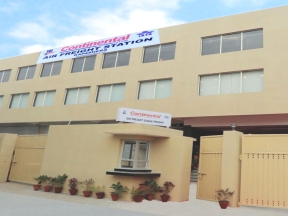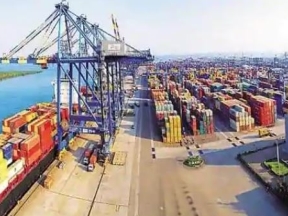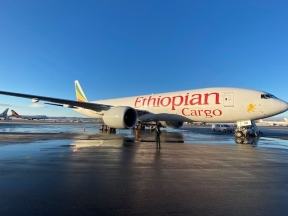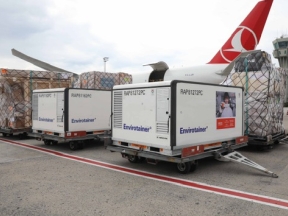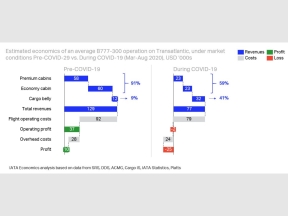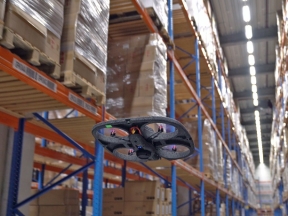CBIC has recently issued revised policy and guidelines for setting up of new Container Freight Stations (CFSs), Inland Container Depots (ICDs) and Air Freight Stations (AFSs). Sharing his views on the policy, Vipin Vohra, Chairman, Continental Carriers, says, “The idea behind the revised guidelines for setting up of ICDs, CFSs and AFSs must be for all the good reasons, but, has no relevance as AFSs are still non-operational despite the fact that the policy was announced way back in 2014. The purpose of AFS was to increase air cargo volumes by decongesting the air cargo terminals at the international gateway airports, thereby reducing air logistics costs for companies engaged in foreign trade.” “Today, when everyone is gearing up for COVID vaccine delivery management, we are still not sure about the future of AFS and facing unnecessary hurdles and roadblocks in making it operational, interestingly, in other countries the concept of off-airport cargo handling is successfully in practice for decades. AFS is an innovative solution that would decongest air terminals and help in cargo management and will certainly give easy space for vaccine logistics management. Air freight stations, close to manufacturing industry, are need of the hour and an essential step towards Hon’ble Prime Minister’s ambitious Make in India’ scheme. To make these new guidelines effective it is important to resolve pending issues related to Air Freight Station Policy. Continental Carriers, which has invested heavily on AFS since 2016, is still waiting for the clearance on fixation of TSP charges by AERA and compliance from Airport Terminal Operator for built-up cargo and loose cargo. The prime objective of concerning authorities should be to resolve issues pertaining to implementation of AFS policy …
Read More »APSEZ ranks 14th on global transportation of Dow Jones Sustainability Emerging Markets Index 2020, ranked in the top 20 of every dimension of 3 criteria
Adani Port & Special Economic Zones (APSEZ) has ranked 14th in the global transportation and transportation infrastructure sector and is the only company from India to have been included in this sector. This initiates the presence of APSEZ on the DJSI Emerging Markets Index, one of the most sought-after sustainability indices in the world that represents the top 10 per cent of the largest 800 companies within the world’s 20 emerging markets and is based on long-term Environment, Social and Economic, and Governance criteria. As part of a stringent DJSI rating process all responses by APSEZ were substantiated with internal documentation and real-life examples and audited by an independent third party to verify the accuracy of the information provided. APSEZ was ranked in the top 20 of every single dimension of the three criteria. In all, just 11 Indian companies made it to the DJSI Emerging Markets Index this year. Karan Adani, Chief Executive Officer and Whole Time Director, APSEZ comments “We are pleased to make an entry into the DJSI Index. As the largest multi-port operator and logistics player in one of the fastest growing markets in the world we recognize the complexity that we are confronted with and therefore being able to achieve this high ranking on our debut into the DJSI Index comes as a shot in the arm for us as well as validates our accountability to our investors, customers, and employees. While our Environment, Social and Economic, and Governance criteria scores are a strong validation that we are on the right path, we really see this as just one point along a more ambitious journey we have embarked on to demonstrate our absolute commitment to …
Read More »Ethiopian Cargo adds Incheon to its Atlanta via Anchorage freighter network
Ethiopian Cargo has launched a transpacific freighter service between South Korea and the US. The air cargo carrier operates B777-200F, one of the most technologically advanced aircraft on the route, offering a remarkable freight service to our cargo forwarding customers worldwide with reduced flight hour, seamless connectivity and better payload. The new B777F service operates from Incheon to Atlanta via Anchorage, with its first flight took place on November 9. Tewolde GebreMariam, Chief Executive, Ethiopian Group says, “We are delighted to have launched our newest freighter service to our cargo forwarder customers worldwide, extending from Incheon to Atlanta via Anchorage in the current global pandemic crisis where speed in the supply chain management is highly required to deliver urgently required goods.”
Read More »First Priority Cargo, BDP International and SAASA join Pharma.Aero as full members
Pharma.Aero has enlarged its membership base with three new full members – Dubai-based logistics and transportation services company First Priority Cargo, global 4PL BDP International and Lima-based ground handler SAASA (Servicios Aeroportuarios Andinos S.A). Over the course of the last two months, Pharma.Aero has onboarded a total of 8 new members. Jeremy Mitchell, Director, Pharma.Aero adds, “The membership of Pharma.Aero continues to grow with like-minded logistics companies. First Priority Cargo has been a long-time partner of Sharjah Airport. We are delighted that First Priority is becoming a member of Pharma.Aero, a testament towards the growing significance of pharma at Sharjah Airport. Pharma.Aero also welcomes BDP International, which has been providing global logistics services for the Pharma industry for decades and SAASA, which provides handling & storage of pharma shipments. The joining of SAASA enlarges our network in South America. We look forward to the new collaborations that could emerge between these new members and our existing members.” Ditlip Sitlani, Vice President, Business Intelligence & Operations, First Priority Cargo said, “We strive to be the best in customer service and pharma safety is an important part of the end to end journey. We are pleased to join a collaborative organisation which understands the care and responsibilities we should all have in this industry. We look forward to adding value and sharing of our thoughts and new ideas with the entire Pharma.Aero membership.” Simona Ravera, Director of Sales, EMEA LifeSciences & Healthcare, Business Development Solutions, BDP International shares, “Following our long term strategic plan and initiatives related to the LifeSciences & Healthcare industry such as to build around customer needs and service models in end-to-end pharmaceutical logistics, BDP International is happy to …
Read More »Jebel Ali Free Zone introduces ECI’s tailored solutions to establish the UAE as a preferred global hub for exports
Jebel Ali Free Zone (Jafza), DP World and Etihad Credit Insurance has showcased innovative trade credit and export financing solutions in a joint webinar. During a well-attended webinar titled, ‘Etihad Credit Insurance Collaboration: Trade with Protection’, Jafza-based companies were given a walk-through of ECI’s solutions as part of the Free Zone’s drive to ensure the growth of businesses, while lowering the cost of export, by reducing the risk of non-payments, and funding, by lowering banking pre and post-shipment funding in the current unprecedented economic climate Jafza has introduced ECI’s tailored solutions to support UAE-based businesses and increase trade by providing them with protection against commercial and non-commercial risks. More than 8,000 companies in the free zone are set to directly benefit from the strategic collaboration of Jafza and ECI, giving export businesses a major boost and a competitive edge in the regional and global markets. Jafza believes that Etihad Credit Insurance’s range of export credit, financing and investment insurance products will directly benefit Jafza’s customers, particularly the SMEs. The partnership will be a game-changer for the export of goods and services because ECI’s support increases cash flow, enables trade and contributes towards sustaining growth even as the markets recover. The shared objectives of ECI and Jafza represent the vision of the leadership to establish the UAE as a preferred global hub for exports. The Free Zone is working closely with ECI to take this partnership forward and reinforce their commitment to business continuity with confidence. In addition, ECI has issued more than 1,600 revolving credit guarantees for a total exposure amount of AED1.2 billion in the first half of 2020, which is equivalent to AED4 billion guaranteed non-oil trade coverage. …
Read More »Turkish Cargo moves COVID-19 vaccines from China to Brazil via its cross-continental air bridge
Continuing its contributions for the sustainability of the global supply chain by building a global air cargo bridge all across the globe with its cargo flights, Turkish Cargo started to carry COVID-19 vaccines with its strong fleet, wide flight network and special cargo service quality. Offering service to 127 countries around the world, Turkish Cargo carried the COVID-19 vaccines, manufactured in China, to Brazil which is at a flight distance of approximately 17 thousand kilometers. The COVID-19 vaccines, loaded inside 7 containers equipped with dedicated cooling systems, were transported safely from Beijing to Sao Paulo, the biggest city of the South America, with a connection flight at Istanbul. By carrying pharmaceuticals to the key and certificated destinations such as Mumbai, Brussels, Istanbul, Singapore, Dubai, Basel, London and Amsterdam, Turkish Cargo created a global pharmaceutical corridor between more than 400 destinations and maintains its commitment for transporting the COVID-19 vaccines that are ready or being developed. Holding the IATA CEIV (Center of Excellence for Independent Validators) pharma certificate, Turkish Cargo, maintains the cold chain at the optimal conditions thanks to the ‘TK Pharma’ product which was has designed for carrying pharmaceuticals at global standards. Transporting pharmaceuticals all across the global in great numbers during the course of the pandemic, the successful brand carried more than 40 thousand tonnes of pharmaceuticals, medical products and medical equipment between January and September, and reported a growth over 50 percent for the pharmaceutical shipments during the same period. Turkish Cargo provided a capacity increase for the COVID-19 vaccine shipments In order to satisfy the increased demand for transportation of the vaccines, pharmaceuticals and temperature-controlled cargo, Turkish Cargo commissioned the temperature-controlled smart warehouse with an additional …
Read More »Strong cargo revenues making some long-haul services possible: IATA
The International Air Transport Association (IATA) has released the weekly economics’ chart showing the estimated economics of an average B777-300 operation on Transatlantic, under market conditions Pre-COVID-19 versus during COVID-19 (Mar-Aug 2020). This week’s chart explores how the economics of such flights have evolved compared to before COVID-19. The association has modelled a typical North Atlantic operation with a B777-300 aircraft, assuming the market conditions before and during the pandemic. According to this this week’s chart, the average flight is almost able to cover its flight-specific operating costs (loss of US$ 2,000). This is in large part thanks to cargo revenues that now play a more important role than previously, accounting for 41 per cent of revenues vs. 9 per cent. However, the model also suggests that covering the non-flight specific fixed costs would be challenging with such low loads. This is all the more concerning as airlines need to spread those costs across their entire fleet, much of which is currently grounded or at least vastly under-utilised. The main assumptions of the model are that passenger load factors drop to the average that airlines have reported in recent months, whilst cargo load factors as well as yields increase as a result of the shrinkage of belly capacity in the market. Fuel costs are also adjusted to reflect the recent prices. It is worth noting that the above simulation is not necessarily representative of all routes and aircraft. Demand for cargo varies largely between route areas with most demand for cargo from Asia to the rest of the world and the B777-300 is an aircraft with one of the largest belly capacities. Depending on the size of the belly and …
Read More »DSV gears autonomous drone system to minimise disruption & improve quality of warehouse operations
In collaboration with tech innovator Verity, DSV is implementing an autonomous drone system in several of its warehouses to help manage inventory. The drone system can scan barcodes without human interaction and detect if pallet positions are empty or occupied. Operating mainly at night, the drones don’t interrupt warehouse operations. Inventory management traditionally involves manual barcode scans to count the warehouse inventory and keep track of stock. Besides being an unsafe and arduous task, manual counts often result in inventory data not being up to date due to discrepancies. The DSV Innovation Hub continually works to innovate DSV’s customer offerings and its operations, and after connecting with Verity, the two companies tested the system at the Moerdijk warehouse in the Netherlands, completing thousands of autonomous flights and tens of thousands of scans. “The drones know down to each centimetre where goods are located, and the information they provide with their scans can be compared with information in our system. This helps us to increase the predictability and visibility of inventory,” says Luca Graf, Senior Director, Innovation, DSV. The pilot showed that manual counts can be avoided to a large extent and that inventory data becomes virtually error-free, thereby helping to reduce stock. The successful pilot now leads to roll-out of the drone system into more DSV warehouses. “We want to offer our customers high-tech supply chain solutions, which is why we work with innovative companies like Verity. We have had a good, hands-on collaboration with them on this drone system, which we expect can benefit many of our warehouse operations where the business case makes sense,” says Peter van der Maas, Executive Vice President, Benelux, DSV Solutions.
Read More »B&H Worldwide and OnLogistics create alliance, serving the aerospace sector with a seamless supply chain solution
In a bid to provide an integrated supply chain management solution enabling aerospace businesses to prioritise and focus on their core activity, B&H Worldwide and OnLogistics have joined forces. “By creating this alliance with OnLogistics we are cementing our position in the aerospace industry as specialists committed to customers who operate within this challenging and time-sensitive vertical market.” says Gary Wilson, Group Managing Director, B&H Worldwide, in adding, “In this collaboration of expertise we aim to serve the aerospace sector with a seamless supply chain solution embracing inventory management, warehousing and international distribution”. Nick Bennett, Managing Director, OnLogistics, adds, “Establishing this new venture with B&H Worldwide is a strategic alliance that will combine the strengths of OnLogistics’ warehousing and ‘on site’ service solutions plus B&H Worldwide’s global forwarding strength. The landscape of aerospace logistics has changed, we must therefore rely on our mutual strengths to deliver an agile and cost-effective service. Our aim is to provide global solutions from a network of local expertise.” OnLogistics is a UK-headquartered aerospace, defence & engineering logistics specialist providing a range of aerospace integration services including contract packing, packaging design & supply, distribution and storage incorporating kitting and direct line feed. Its capabilities have tremendous synergies with B&H Worldwide whose own services bridge the operational and visibility gap between the aircraft and its global freight network. B&H’s unrivalled expertise in delivering freight solutions across the aerospace industry combined with the supply chain transparency means it can provide customers through the use of its innovative, in-house designed IT solutions are highly tailored to suit customer operating models. Its custom-designed FirstTrac software sets the benchmark for the aerospace logistics industry.
Read More »Shankar Shinde elected as the MD of IFCBA, underlining the importance of FFFAI and India in international logistics business
Shankar Shinde, Chairman Elect, Federation of Freight Forwarders Associations in India (FFFAI) has been elected unanimously as Managing Director of the International Federation of Customs Brokers Association (IFCBA). IFCBA enjoys the status of Private Sector Consultative Group (PSCG) representation on World Customs Organisation (WCO).The election of Shinde in IFCBA’s crucial position once again underscores the growing importance of FFFAI and India at large in the international Logistics & Customs Brokers business. Having more than 30 years of experience in Logistics and Customs Broking industry Shinde is very well-known for his huge contribution to the entire industry. Apart from FFFAI and IFCBA, he has also been associated with various industry associations including Nashik Customs House Agents Association as President, International Federation of Freight Forwarders Associations (FIATA) as FFFAI nominated representative, Brihanmumbai Customs Brokers Association, Maharashtra Chamber of Commerce & Agriculture, etc. In addition, from FFFAI Shinde is spearheading the International North South Transport Corridor (INSTC) project collaborating with the Government of India. “The international trade community depends on the work done by Customs Brokers and IFCBA serves Customs Brokers by keeping them at the centre of the international trading system. It is IFCBA’s mission to promote the value and use of Customs Brokers worldwide,” emphasized Shinde while commenting on the importance of IFCBA. IFCBA works to bring about improvements in Customs policies and best practices on a global basis. These improvements benefit both Customs and Customs Brokers for achieving transparency in trade facilitation measures, brainstorming towards innovation for recommendation of seamless cross border customs processes and standardization with use of technology in achieving paperless transaction.
Read More » Cargo Breaking News
Cargo Breaking News
